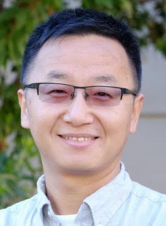
Date:
Location:
Speaker:
Abstract: The distribution, dimension, and relaxation dynamics of polymer clusters formed by random crosslinking are highly susceptible to the degree of gelation. A set of closely related power laws or ansatze are normally used to characterize the variation of these properties in the gelation window. Away from the gel point, the scaling exponents are expected to classical, as noted by Flory. Sufficiently close to the gel point, however, the classical scaling fails because the clusters overfill space, and the critical exponents set in. This crossover has been indirectly employed to rationalize the rheological responses of physical gels in the linear regime, but has not been directly probed, partially because the gelation window is narrow. Here, we present a hybrid MC/MD simulation model, which implements a configuration- biased cross-linking protocol, and present the simulation results on the distributions of cluster number, size and lifetime. The cluster number distribution is closely examined, and the shape of the wrapping function is rationalized using mass conservation. The cluster size shows clear evidence for crossover from classical to critical scalings. The lifetime statistics corroborates the effective break-up picture for dynamic clusters, that results from the competition between diffusive relaxation and reversible cross-linking.
Bio: Jian Qin is an Assistant Professor in the Department of Chemical Engineering at Stanford University. He received B.S.and M.S. degrees in Materials Science from Tsinghua University, and his Ph.D. from University of Minnesota under the supervision of Profs. David Morse and Frank Bates. Following postdoctoral fellowships at Pennsylvania State University, with Prof. Scott Milner, and The University of Chicago, with Prof. Juan de Pablo, he joined Stanford University as aTerman Faculty Fellow in 2016. His research focuses on theoretical study of morphological and rheological behavior of polymeric fluids, electrostatic interactions in structured electrolytes, and surface charge polarization. He has held theKadanoff-Rice Fellowship and has been recognized by the 3M Non-Tenured Faculty Award, the Hellman Faculty Award, the NSF CAREER Award, the ACS PMSE Arthur Doolittle Award, the ACS PMSE Young Investigator Award, the Tau BetaPi (Stanford) Teaching Honor Roll, and the APS Dillon Medal.



